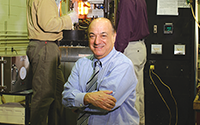Stewards & Scholars: Swanson’s Department of Mechanical Engineering, Materials Science Promotes Career Opportunities Within Steel Industry
 Materials science was a popular engineering discipline back in the 1960s, when Anthony DeArdo—now Pitt’s William Kepler Whiteford Professor of Mechanical Engineering and Materials Science in the Swanson School of Engineering—was an undergraduate student.
Materials science was a popular engineering discipline back in the 1960s, when Anthony DeArdo—now Pitt’s William Kepler Whiteford Professor of Mechanical Engineering and Materials Science in the Swanson School of Engineering—was an undergraduate student.
“It was the early days of the oil embargos, and everyone wanted to develop stronger steel that was more energy efficient,” recalls DeArdo, who was a metallurgical engineering major. “We were the top dogs.”
DeArdo, who also is the director of Pitt’s Basic Metals Processing Research Institute, would like to see the study of ferrous metallurgy and subsequent employment in the steel industry recapture some of that former cachet. Many engineering students overlook the possibility of a career in the metals manufacturing industries in favor of newer fields such as sustainability or bioengineering. “The steel industry needs these students—and studying ferrous metallurgy offers many professional opportunities,” he says.
DeArdo has worked for 35 years as a professor and researcher in the area of structural materials composition. Among his many accomplishments is the 1999 development at Pitt of lead-free “green steel”—an industry breakthrough because the environmentally friendly steel offers the unique combination of excellent machinability without lead contamination.
At Pitt, students in materials science—which includes the study of ceramics, polymers, and metals—have the opportunity to study ferrous metals, such as steel—in addition to the more common study of nonferrous metals, such as aluminum and titanium. The addition of ferrous metals to a student’s academic track can make him or her stand out to an employer who faces a sea of engineering resumes.
Dennis Haezebrouck, a senior research consultant at U. S. Steel’s Research and Technology Center in Munhall, says it has become increasingly difficult to find candidates who have had academic training in ferrous metallurgy. Pitt is one of only three schools in the United States that still offers its students coursework and research opportunities in the ferrous metallurgy field.
“Experience in metallurgy is a skill that we target, and we are increasing our hiring of materials science students,” says Haezebrouck.
Recent Pitt grads Kelly John Alderson (ENGR ’07) and David Snyder (ENGR ’12) have reaped the benefit of choosing to study metallurgy.
Snyder was hired in May by U. S. Steel as a management associate in metallurgy and quality assurance. His hiring coincided with his graduation, during which he received his bachelor’s degree in mechanical engineering, a minor in materials science with a concentration in metallurgy, and a certificate in nuclear engineering from Pitt’s Swanson School. Snyder says that he developed his interest in materials science and metals during a nuclear engineering internship. He expressed that interest to Pitt’s Department of Materials Science and then began hearing regularly from DeArdo, who encouraged Snyder to enroll in metallurgy classes.
Alderson also studied with DeArdo and his colleague C. Isaac Garcia, a research professor in Pitt’s Department of Mechanical Engineering and Materials Science. Alderson recalls that both professors urged their students to consider careers in the steel industry, extolling steel as the most widely used metal in many areas of manufacturing, construction, energy, and medicine.
Alderson is now a quality engineer in the Basic Oxygen Process Shop at U. S. Steel’s Edgar Thomson Plant near Pittsburgh. He is working toward earning a Master of Science degree in materials science engineering at Pitt next year.
Alderson and Snyder say they enjoy working in both office and manufacturing environments. And both say they hope to play a role in helping produce stronger, lighter, and more cost-efficient steels.
U. S. Steel said it values the importance of materials science education programs that will help train its future workforce. The company supports the materials science department at Pitt with annual grants in the hope that students like Alderson will receive the specialized training they need to help advance steel production.
Haezebrouck explains that U. S. Steel is particularly interested in developing advanced high-strength automotive steels to help automobile makers meet increasing crash safety and fuel efficiency standards. In addition, such steels are suited for tubular products used by the natural gas and oil industries to address unique geological needs found in underground environments.
University departments such as Pitt’s Department of Mechanical Engineering and Materials Science are able to conduct specialized research in fields like microstructural analysis—something that corporate research labs are hard-pressed to do. It is hoped that the resulting breakthroughs will strengthen the already strong bond that one of the country’s top steel producers has with top materials scientists at Pitt.
Other Stories From This Issue
On the Freedom Road

Follow a group of Pitt students on the Returning to the Roots of Civil Rights bus tour, a nine-day, 2,300-mile journey crisscrossing five states.
Day 1: The Awakening
Day 2: Deep Impressions
Day 3: Music, Montgomery, and More
Day 4: Looking Back, Looking Forward
Day 5: Learning to Remember
Day 6: The Mountaintop
Day 7: Slavery and Beyond
Day 8: Lessons to Bring Home
Day 9: Final Lessons

